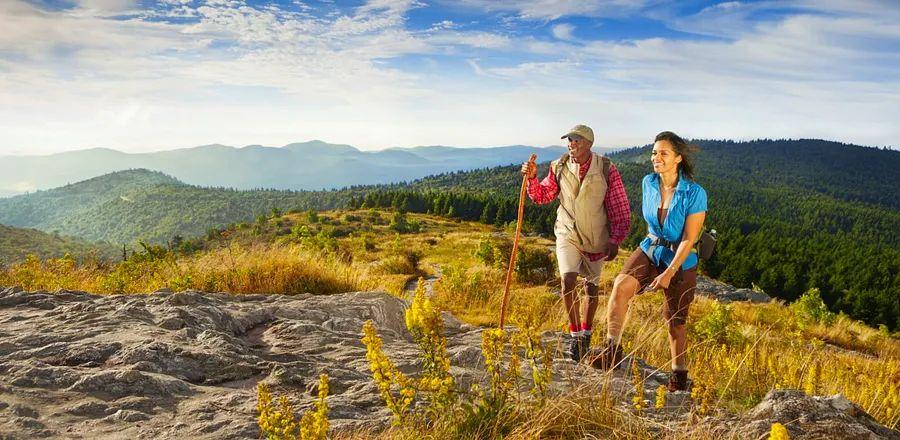The Definitive BIPOC Outdoor Guide to Asheville

This isn’t just any outdoor guide to Asheville, the North Carolina city nestled in the stunning Blue Ridge Mountains. Here, we explore the region’s vibrant array of outdoor experiences through the perspectives of the BIPOC individuals who have called Asheville home for generations. This guide celebrates the rich diversity and cultural vibrancy that are deeply rooted in the contributions of its communities of color—an integral part of Asheville’s narrative. Join us as we embark on an exploration of lush landscapes, revealing stories, tips, and hidden gems that echo the diverse spirits of many explorers.
Asheville’s Diverse Heritage and Natural Beauty
At the heart of Asheville lies a dynamic blend of spaces, community-driven initiatives, and sustainable businesses dedicated to sharing and preserving the time-honored energy of a vibrant mountain community known for its tranquil atmosphere. The air is filled with wellness as breathtaking views of the Blue Ridge Mountains welcome you upon arrival.
Local treasures like Second Gear, an outdoor gear consignment shop, and the Asheville-based nonprofit Dogwood Alliance play vital roles in maintaining this spirit. Both organizations strive to make Asheville’s natural spaces accessible and inviting for everyone. For over twenty years, Dogwood Alliance has worked tirelessly to protect and nurture the forests surrounding Asheville for future generations. Meanwhile, Second Gear offers high-quality outdoor gear at reasonable prices, supporting the local community through an inclusive mission and donating 1 percent of all sales to nonprofits. Be sure to check the Second Gear calendar for cleanups, events, hikes, and advice on what gear to bring for your next outdoor adventure in Asheville.

Photo by Andre Daugherty
For those drawn to the region's wild flora and fauna, the Chestnut School of Herbal Medicine offers an abundance of resources, including a directory of local herbal conferences and earth skills gatherings, as well as guides for foraging wild edibles, botany, and plant identification. This serves as a wonderful reminder of the area's rich biodiversity. Whether embarking on a plant scavenger hunt with the kids, enjoying a hiking date night, or capturing the landscape’s beauty through photography, spending time outdoors in the Asheville area guarantees an uplifting and unforgettable experience.
Looking for a community-driven, farm-to-table experience? Be sure to check out Southside Community Farm (SCF) and Southside Kitchen—which evolved from a small garden behind the Arthur R. Edington Center into symbols of sustainable agriculture. In 2022, Southside Kitchen partnered with SCF to provide nearly 500 scratch-made meals daily to children at several local schools while also feeding nearby residents. The efforts of these organizations honor community resilience and Black food sovereignty, highlighting the value of local produce. If you’re interested in a volunteer vacation, reach out to SCF for upcoming work parties, and explore Asheville GreenWorks for events like litter cleanups, river restoration, and tree planting.
New trails enhance outdoor adventures that honor diversity

Courtesy of Explore Asheville
Discover more inclusive outdoor experiences within the city, revealing stories that resonate with its spirit of community, resilience, and diverse heritage. The newly launched Asheville Black Cultural Heritage Trail, one of the first of its kind in the area, connects historic Black neighborhoods and highlights the untold narratives of well-known landmarks—along with those that have disappeared—bringing attention to the histories that have been overlooked while honoring the remarkable heroes, achievements, and contributions of the local Black community.
The Historic James Vester Miller Trail pays homage to one of Asheville’s distinguished Black builders, recognized as one of the most prolific builders of the early 20th century. Born to a formerly enslaved individual, Miller’s ascent in a racially divided era showcases his extraordinary talent, resilience, and entrepreneurial spirit. Other notable architectural highlights along the Trail include Mount Zion Baptist Church, the Municipal Building, and St. Matthias Episcopal Church.
Organizations and locations that champion inclusivity in outdoor activities

Photo by Robb Leahy
Unsure where to begin? We suggest starting your journey into the region’s Black history at The Block, a historic Black business district that has been revitalized into a community hub featuring the iconic YMI Cultural Center, one of the oldest African-American centers in the nation. If you can, plan your visit in the fall to experience the Goombay Festival, a flagship program of YMI that celebrates African and Caribbean culture through music, dance, food, and crafts.
Tanya Marie Pender and her husband Larry Pender founded Pathways to Parks with the goal of increasing outdoor participation among people of color. Other organizations supporting BIPOC outdoor initiatives include Asheville Run Crew, the cycling group Riding in Color, and North Carolina BIPOC Climbers. Additionally, the North Carolina Department of Natural and Cultural Resources and Color My Outdoors work to ensure everyone, regardless of background, can enjoy nature.
Additional BIPOC experiences and outdoor tours

Photo by Andre Daugherty
For those looking to support Black-owned businesses, Asheville has plenty to offer. In the Burton Street neighborhood, The Peace Gardens serves as a vibrant oasis filled with upcycled art, unique found objects, and other creative displays—a testament to diversity brought to life by Safi Mahaba and DeWayne Barton. As you stroll through its paths, each plant, mural, and nook shares stories of the local community and its unwavering commitment to fostering its environment. The Gardens are also featured on the Hood Huggers Tours, founded and guided by Barton, which take groups on weekly explorations of Asheville's rich Black history, culture, and resilience. Both walking and driving tours are available.
If you’re a coffee lover, make sure to include Asheville Coffee Tours on your itinerary, created by Jarika Johnson, who conceived the idea while working as a barista at Trade & Lore. You’ll discover that each café has its own story, often interwoven with art, music, and local folklore. For a riverside coffee experience infused with culture, visit the Black-owned coffee shop and co-working space Grind Coffee Bar in the River Arts District. Every street and corner in this city resonates with the rhythms of its people—and there’s truly no better way to connect with the outdoors than by exploring Asheville’s diverse community.
Evaluation :
5/5



